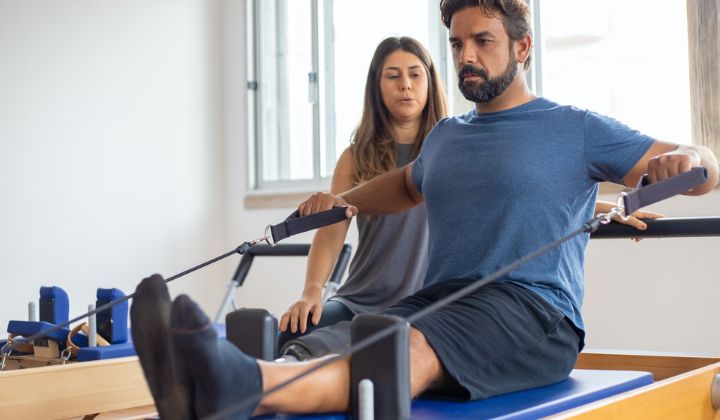As we’ve mentioned many times on our site, we’ve had the pleasure of working with and meeting hundreds of physical therapists over the last 40 years. Nowadays, it seems like we’re on every corner (not a bad thing, in general!).
With all the options near you, we’d like to offer some insight into how to choose a physical therapist:
To choose a physical therapist, look for someone with proper credentials and experience in treating your specific condition. Look at their qualifications, read reviews, and consider recommendations from healthcare providers or friends. Additionally, ensure they communicate well and make you feel comfortable during sessions.
In this article, we’ll go over each of these points in detail, and provide some insight into choosing the right physical therapist for your unique situation.
Before you meet them
There are a couple of ways to assess a physical therapist’s fit prior to even meeting with them. This should help you narrow down the choices in your area:
Look at their credentials
Perhaps the most obvious thing to do if you’re considering working with a physical therapist is to check their credentials. These should typically be front and center on the therapist’s bio page or easily accessible on their website.
Different physical therapists can have different certifications, but what we’re really interested in is their licensure. In general, you want to look for “PT” or “DPT” (doctor of physical therapy) next to their name. If you’ve got any reason to doubt their legitimacy, you can always go to the website for your state’s board of physical therapy. From there, you should be able to ensure the provider in question is a licensed physical therapist, active, and in good standing.
Additional credentials they display can typically easily be searched, if you’re not sure what they mean. You may find that a certain therapist in your area has a specialty certification that is particularly of interest to you.
Understand their specialties
Many physical therapists have a specialty or a certain area of interest regarding who they work with. A physical therapist’s specialty can be a certain demographic, such as athletes or seniors. It can also be a certain condition, such as an Ehlers-Danlos specialist or pelvic floor therapist.
Regardless, one of the ways we can know in advance if a physical therapist will be a good fit is to look at what they consider to be their specialties. Taking a look at their social media, any articles they’ve written, and their website is typically a good way to figure this out. Additionally, you could simply call the therapist’s office and ask them.

Read reviews and get recommendations
Online reviews can provide valuable insights into a physical therapist’s practice. Look for consistent themes in the feedback, such as professionalism, effectiveness, and bedside manner. As a rule of thumb, a good physical therapist generally should be achieving 4.5 stars on Google.
Additionally, if your primary care physician has provided you with a referral for physical therapy, ask them who they recommend! Healthcare professionals have generally worked with individual therapists very frequently, and they may have some strong recommendations towards a particular therapist in your area.
Lastly, go to friends and family members for recommendations. Personal experiences can be incredibly helpful in making your decision.
Verify health insurance coverage and costs
Lastly, before committing to a physical therapist, verify that they accept your insurance plan. If you have trouble affording the cost of physical therapy, then your access to physical therapy through that particular practice may be a determining factor.
This step can save you from unexpected out-of-pocket expenses. Additionally, ask about the cost of sessions if you’re paying for physical therapy out-of-pocket and whether they offer payment plans.
After or during your initial evaluation or consultation
Despite the front-end research described above, choosing a good physical therapist often requires an initial consultation with the therapist. In some cases, this initial meeting may be a free consult, or it may be a billable initial evaluation.
Assess their communication style
We’re aware that we sound like a broken record on this point, but one of the red flags of a bad physical therapist is if you don’t feel that the way they explain things resonates with you.
During the course of treatment, your therapist will need to explain many things to you, including the rationale for certain modalities or exercises in the treatment plan, how to perform various strengthening and mobility drills, and how to assess your therapy program’s progress.
Additionally, they’ll need to be in-tune with your needs and be able to effectively field the questions you ask throughout the process.
If you don’t leave the initial consultation or evaluation feeling as though you’re on the same page with your therapist, it may be a sign to look elsewhere.

Consider the clinic’s environment and location
The physical therapy practice’s environment can significantly influence your therapy experience. When you visit the clinic, assess whether it’s an environment you can see yourself visiting two to three times per week for the next few months!
The physical therapy clinic should be clean, well-equipped, and staffed by friendly, professional personnel. Additionally, the clinic’s location and hours should be conducive to your work schedule, home location, etc.
Additionally, ask about the choices you’ll have in the clinic. Some clinics assign patients a physical therapist, whereas others are allowing people to choose their own physical therapist.
One of the things we’re going to ask of you is to consistently keep your appointments. If this is a struggle for you, then finding someone closer to your house or with different hours may make more sense.
Next steps
Our goal as physical therapists is to empower you with the tools you need to take control of your health care over the long term. In light of this, we believe that it makes sense to do some research on the front end to ensure that you choose a good physical therapist that’s going to serve you and fit your needs.
If you’ve got any questions for us, feel free to reach out to us and ask questions – we’re here to help!

















